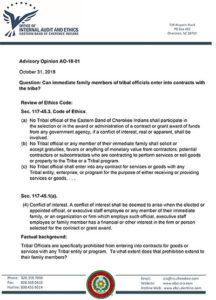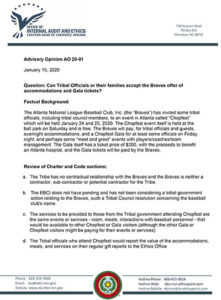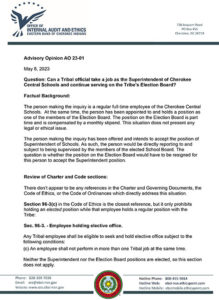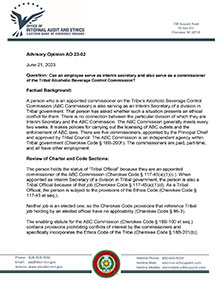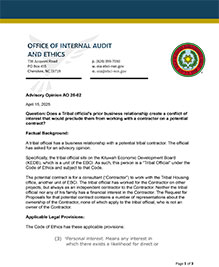
Ethics
A Code of Ethics was adopted to establish, promote, regulate and enforce minimal standards of ethical conduct binding upon all Tribal officials. This is to help instill public confidence and trust by maintaining and ensuring the highest ethical standards of conduct are practiced by Tribal officials and to promote greater awareness of the purpose and function of ethical guidelines in Tribal governance among both Tribal officials and the Tribe as a whole. The Office of Internal Audit and Ethics is responsible for administering and enforcing the Code of Ethics including issuing advisory opinions, providing education, administering disclosure processes and investigating complaints. In addition to practicing ethical standards, Tribal officials are required to disclose to the Office of Internal Audit and Ethics (1) gifts, donations, or contributions; (2) charges or convictions; and (3) instances of fraud, waste, abuse, corruption or violations of the Code of Ethics.
Complaints
In accordance with Cherokee Code Chapter 117, Article IV we have the authority to investigate ethical violation complaints against Tribal officials. Anyone can file a complaint. A complaint must be in writing and signed by the person submitting the complaint. We will not consider complaints regarding allegations that:
- Involve an ordinance outside our jurisdiction
- Occurred or became known to occurred more than 3 years ago
- Are frivolous or groundless
- Purport potential criminal or other unlawful activity outside our jurisdiction
- Are subject to administrative or personnel proceedings or criminal investigation
Advisory Opinion
Advisory opinions are used to clarify the interpretation or application of the Code of Ethics. Any Tribal official can request an advisory opinion. Requests for an advisory opinion must be writing and contain the basis of the request including a written scenario with all relevant information. Advisory opinions will not be made it the request concerns the subject matter of pending litigation known to the committee.
Can Tribal Officials solicit sponsorship at USET? Is this a contribution if vendors undertake the sponsorship?
If you are a political appointee and decide to run for elective office, do you have to resign from your position?
Am I allowed to cost share a trip with a longtime friend, who is a majority co-owner of a business that contracts with the Tribe? If so, what needs to be reported?
Can a Tribal Official sell land to the Tribe as long as they are not involved in the decision process?
Can farm equipment owned by the Tribe be used by volunteers to provide garden plowing for some Tribal members?
Can a Tribal Official take a job as the Superintendent of Cherokee Central Schools and continue serving on the Tribe’s Election Board?
Can an employee serve as interim secretary and also serve as a commissioner of the Tribal Alcoholic Beverage Control Commission?
How do the obligations of Tribal officials to their Tribe align or conflict with their duty of loyalty when participating on State or Federal advisory boards or commissions?
Does a Tribal official's prior business relationship create a conflict of interest that would preclude them from working with a contractor on a potential contract?
Are there ethical implications for a Tribal official working (as employee or independent contractor) with a consulting group that does not contract with the Tribe or Tribal entity?
Can an elected member of the Cherokee School Board, who also serves on the Board of Directors of the Cherokee Boys Club, request a construction bid for their house from the Boys Club's Construction Department if their spouse holds a supervisory position in that department?
Reporting
The following must be reported by Tribal officials:
Gifts, Donations or Contributions
Any gift, donation or contribution given or received by the Tribal official must be reported on a quarterly basis as follows:
-
- 1st Quarter (October – December) due January 15
- 2nd Quarter (January – March) due April 15
- 3rd Quarter (April – June) due July 15
- 4th Quarter (July – September) due October 15
Fraud, Waste, Abuse, Corruption, and Ethical Violations
Any instance of potential fraud, waste abuse, corruption, or ethical violations known by the Tribal official must be reported immediately. A hotline is available 24 hours 7 days a week. A report can be made by calling 800-455-9014 or on the web at ebci.alertline.com. A report can also be made to any staff of the Office of Internal Audit and Ethics. Reports must include as much information as possible to aide in an investigation if warranted.
Charges or Convictions
Any misdemeanor or felony charges or convictions against a Tribal official must be reported immediately or as soon as reasonably possible but not later than 24 hours. Reports can be made by calling 828-359-7074 or 828-359-7072. If necessary, a voice message may be left. Documents outlining the details of the charge or conviction must be submitted within five (5) days of the occurrence. Subsequently, documentation of the disposition of the charge or conviction must be submitted within five (5) days of the disposition.
Attestation and Disclosure Statement
Tribal officials will file an Attestation and Disclosure statement with the Office of Internal Audit and Ethics upon election or appointment and no later than October 15 of every year thereafter. The Attestation and Disclosure Statement must be on a form prescribed by the Office of Internal Audit and Ethics and must include the following:
-
- Attestation statement that the Tribal official received, read, understands and will abide by the Code of Ethics.
- A list of the Tribal official’s immediate family as defined in Cherokee Code 117-45.1(a)(5).
- A list of businesses or entities in which the Tribal official or immediate family has a personal interest as defined in Cherokee Code 117-45.1(a)(3).
Ethics Advocates
Ethics Advocates are selected every 4 years by the Audit and Ethics Committee through an application process.
Minimum requirements for Ethics Advocates are as follows:
-
- Must be an enrolled member of the EBCI & reside on trust lands in one of the six Tribal Townships
- Must be at least 22 years of age or older
- Must have a Bachelor’s Degree or higher, J.D preferred
- Cannot be a Tribal Official as defined by Cherokee Code 117-45.1(a)(1)
- Cannot have any pending criminal charges or any felony convictions
